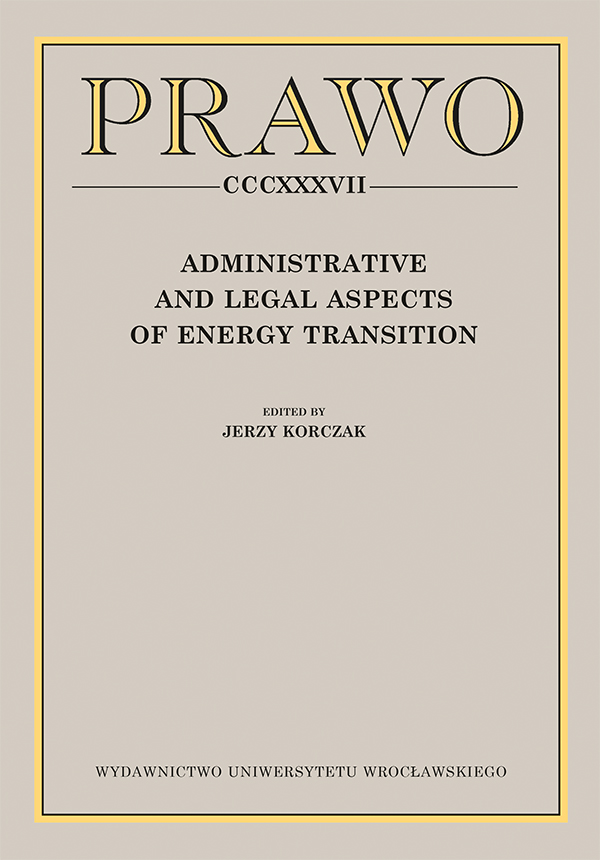

Artykuły

In recent years, the Council of the European Union increasingly invoked the emergency competence of Art 122(1) TFEU for the adoption of legislative acts. The present article sheds light on the scope and limits of this article and aims to contribute to the provision’s hitherto scarce academic analysis. The Council of the European Union adopted six “emergency regulations” based on Article 122(1) TFEU to overcome the energy crisis. According to the wording of the provision alone, the requirements for invoking Article 122(1) TFEU as a legal basis do not seem to be high. This is surprising as the European Parliament and other institutions are not involved in the lawmaking process under Article 122 TFEU, and the Council decides by qualified majority. Therefore, four unwritten, or to be defined in more detail, conditions need to be fulfilled for the adoption of measures based on Article 122(1) TFEU: there must be serious economic difficulties, the measures adopted must be “appropriate” to the economic situation, there must be a causal relationship between the cause of economic difficulties that authorize the taking of measures and the objectives pursued by the Commission and the Council, and there must be an urgency that manifests itself in the fact that the ordinary legislative procedure cannot be awaited. Article 122(1) TFEU constitutes an exception from other EU competences, in particular Article 194 TFEU; therefore, there is a need to analyse whether it is reasonable to waive the specific requirements set out in these rules. One may think of the sovereignty limitations in Article 194(2) TFEU and the special requirements under Article 194(3) TFEU. The criterion “in the spirit of solidarity” is to be understood rather broadly and requires the balancing of the affected interests, including those of the Member States and of the Union as a whole.
Boin A., Ekengren M., Rhinard M., The European Union as Crisis Manager, Cambridge 2013, pp. 1–20.
Calliess Ch., “Art. 194 [energiepolitik],” [in:] EUV/AEUV. Das Verfassungsrecht der Europäischen Union mit Grundrechtecharta Kommentar, eds. Ch. Calliess, M. Ruffert, München 2022, pp. 1908–1918.
Chachko E., Linos K., “Ukraine and the Emergency Powers of International Institutions,” The American Journal of International Law 116, 2022, no. 4, pp. 775–785.
Hackermann T., Weiler D., “EU-NotfallVO: Vereinbarkeit der EU-NotfallVO mit Art. 122 Abs. 1 AEUV und mögliche Auswirkungen auf das EU-EnergiekGB,” Internationale SteuerRundschau 12, 2023, no. 3, pp. 70–80.
Häde U., “Art. 122 [Maßnahmen bei gravierenden Schwierigkeiten],” [in:] EUV/AEUV. Das Verfassungsrecht der Europäischen Union mit Grundrechtecharta Kommentar, eds. Ch. Calliess, M. Ruffert, München 2022, pp. 1555–1558.
Härtl I., “Die Zuständigkeiten der Union,” [in:] Europarecht. Grundlagen und Politiken der Union, ed. M. Niedobitek, Berlin 2019, pp. 447–523.
Hirsbrunner S., “Article 194 [Ziele; Maßnahmen],” [in:] EU-Kommentar, eds. Ulrich Becker et al., Baden-Baden 2019, pp. 2474–2481.
Khan D.-E., Richter C., “Art. 122 [Gravierende Schwierigkeiten],” [in:] EUV AEUV Vertrag über die Europäische Union Vertrag über die Arbeitsweise der Europäischen Union Kommentar, eds. R. Geiger et al., München 2023, pp. 661–663.
Nettesheim M., “Next Generation EU”: Die Transformation der EU-Finanzverfassung,” Archiv des Öffentlichen Rechts 145, 2020, no. 3, pp. 381–409.
Ruffert M., “Europarecht für die nächste Generation. Zum Projekt Next Generation EU,” Neue Zeitschrift für Verwaltungsrecht 24, 2020, pp. 1777–1780.
Talus J., Mcculloch J., “The interpretation of the principle of energy solidarity – A critical comment on the Opinion of the Advocate General in OPAL,” Energy Insight 89, 2021, pp. 1–10.
De Witte B., “EU Emergency Law and its Impact on the EU Legal Order,” Common Market Law Review 59, 2022, no. 1, pp. 3–4.